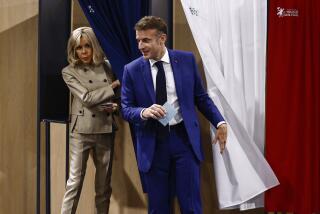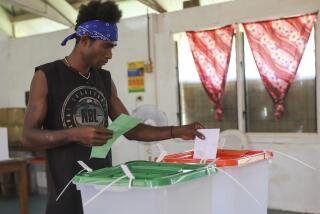In Fallouja, Lining Up to Have Their Say
- Share via
FALLOUJA, Iraq — The referendum on Iraq’s constitution was important enough to Mufeed Abed Ghafour that he cast not just one, but five ballots.
Ghafour walked into a polling station at Al Asad School on Saturday and cast a ballot for himself, his wife and his three children.
“We all came earlier,” he said. “But the crowds were too large. So now I have returned and have brought their ballots for them.”
Impassioned election workers openly discussed their views on the proposed charter a few feet away from cardboard voting stands.
Security was dicey. A local election official said there were more than a dozen hand-grenade attacks against Iraqi troops in and around Fallouja, and the day before, someone firebombed a local political party office.
Mistrust of Iraqi security forces runs so deep that local tribes formed their own guard units for polling stations and urged the soldiers to keep away.
And many residents’ knowledge of the subject of their votes, a complex document completed only last week by Iraq’s National Assembly, was sketchy at best.
This is what a successful election looks like in battle-scarred Fallouja, a predominantly Sunni Arab city where only 7,000 residents out of a pre-invasion population of about 350,000 voted in Iraq’s parliamentary elections in January. In the aftermath of a massive U.S. offensive in Fallouja last year, most residents were displaced; most who remained boycotted the vote at the behest of Sunni Arab leaders.
On Saturday, nearly 75% of eligible voters, an estimated 150,000 people, cast ballots in the Fallouja area in a vote relatively unimpeded by violence. The large turnout signaled not only the willingness of a large Sunni Arab community to participate in Iraq’s nascent political process but the unwillingness or inability of insurgents to disrupt the vote.
John Kael Weston, a State Department official assigned to Fallouja, said that a large reason for the shift from January’s boycott to Saturday’s high turnout was the decision of 50 clerics to endorse participation in the referendum.
“We’re seeing grass-roots organizations telling people to vote, not necessarily because it’s what they want to do, but because they have to do it,” Weston said. “They realize that if they don’t participate they don’t have a lot of other options. They also realize that they made a mistake in January by sitting out the last election.”
Like many Falloujans, Anad Aboud, 65, boycotted the January election. Aboud’s house was destroyed and three of his sons were killed by Iraqi soldiers, he said, shortly after the worst of the fighting in Fallouja. He said that local clerics had persuaded him to vote.
“This our election, and we have to express our opinions,” he said. “The clerics, they told us in their sermons that we should vote.”
Although no results were available Saturday, anecdotal evidence suggested that Falloujans would vote heavily against the proposed charter.
“I will vote no because I am against sectarianism,” said Hareth Abdul Kareem, a 46-year-old merchant. “Iraq should be one nation. Sunni, or Shiite, or Kurd -- we are all Iraqis.”
Many Sunni Arabs had expressed concerns that the proposed constitution opened the door for eventual secession by the predominately Shiite south or the largely Kurdish north.
Last week, however, the Iraqi Islamic Party, a major Sunni Arab political party, agreed to back the constitution in exchange for the chance to renegotiate the document after the next parliament is elected in December.
But the Islamic Party’s agreement to support the constitution appeared to have little traction in Fallouja. Unknown attackers firebombed party offices in Fallouja on Friday night, and voters derided the organization for changing its position on the draft constitution.
Rafa Alwan Mahana, 48, a retired teacher, said Fallouja’s council of clerics was disappointed by the party’s decision. If the party wanted to take a position, he said, “the Muslim community should be asked first. They did this without consulting.”
Weston said that heavy participation in the vote had undercut extremist groups.
“You’ve got the grass roots, the whole community standing up and saying they want to participate in the election process,” said Weston, who has been assigned to Fallouja for 18 months. “If you see your neighbors, your relatives, your own people walking down the street to vote, do you want to kill them? Probably not.”
Sheik Dhari Abdul Hadi, who is Fallouja’s mayor, said that he was less concerned about which way people voted than how many people voted.
“They are going in great and huge numbers and I noticed this morning that they were joining overcrowded lines,” Hadi said. “All the voters know their responsibility to their future of this country.”
Weston estimated that Fallouja’s vote would comprise roughly 80% of the total vote in the western Al Anbar province, a vast, but sparsely populated Sunni Arab region. The desert province has been a main thoroughfare for insurgent groups trekking over the border from Syria and the target of several major military offensives.
Much of the province will likely report much lower turnouts than Fallouja, Weston said. Marines have been tracking down insurgent groups in Al Anbar towns such as Qaim and Ramadi, and fighting has displaced enough people to lower voter turnouts.
Fallouja has become a key piece of the U.S. public relations effort in Iraq. The U.S. Embassy flew several journalists to Fallouja to observe the election and coordinated security with Marines and Iraqi police throughout visits to polling stations in prescreened areas of the city.
About 4,000 Iraqi soldiers and police officers patrol Fallouja’s streets. Generally, only residents of the city are allowed to enter, and the Marines are closely monitoring them.
Marines said as many as 70,000 Falloujans have been subjected to retinal scans and have had their names entered into a military database. All residents must carry identity cards and can be detained if they attempt to pass without the papers. Residents said their unhappiness with tight security was another reason to vote.
“The Iraqi security forces are doing patrols and raids, they are torturing innocent people,” said Amir Ismael, 45. “We have no freedom, we are oppressed in this place.... I will express my opinion, and I feel satisfied that all my neighbors will say no to this constitution.”
Fallouja itself has been slowly rebuilding. The Iraqi government has spent $200 million this year to compensate Iraqis who lost family members or homes when 6,000 Marines and 1,300 Iraqi soldiers assaulted insurgent fighters in the city. The money is also being used to rebuild Fallouja’s damaged sewers, power lines and other infrastructure.
Two-thirds of Fallouja’s buildings were destroyed in the fighting -- everywhere there are broken roofs, clipped mosque minarets and gaping holes in walls.
During a brief meeting Saturday with local leaders at a Marine outpost, U.S. Ambassador Zalmay Khalilzad urged residents to continue to build their local institutions and their political voice.
A tribal leader told Khalilzad that the central government still owed Fallouja millions of dollars in reconstruction money. The local leaders also said Al Anbar province should be represented by more parliament members during the December elections.
Hadi, the mayor, expressed his fears that the constitution could further divide the nation, and his hope that relations among Sunni Arabs, Shiites and Kurds could replicate the Saddam Hussein era when, he said, there were no divisions.
“Of course, nostalgia for the past should not be a motive driving the political process here,” Khalilzad said. “The past is finished. It is gone.”
More to Read
Sign up for Essential California
The most important California stories and recommendations in your inbox every morning.
You may occasionally receive promotional content from the Los Angeles Times.










